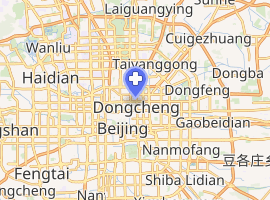Beijing Hospital of Traditional Chinese Medicine
The Beijing Hospital of Traditional Chinese Medicine is a hospital network headquartered in the region of Beijing, China. The hospital network has approximately 2,500 beds and has three institute and centers, the Institute of Traditional Chinese Medicine, Zhao Bingnan's Medical Center of Dermatosis, Beijing International Training Center for Acupuncture as well as an additional 26 clinical departments.
| Beijing Hospital of Traditional Chinese Medicine | |
|---|---|

| |
| Geography | |
| Location | 23 Meishuguan Back St, Beijing, Dongcheng District, China |
| Coordinates | 39.906388°N 116.265471°E |
| Organisation | |
| Care system | Public |
| Services | |
| Beds | 2,500 |
| History | |
| Opened | 1956 |
| Links | |
| Website | en |
| Lists | Hospitals in China |
The hospital network is listed as one of the largest hospital networks in the world in terms of available beds. Its flagship location is the Capital Medical University Beijing Hospital of Traditional Chinese Medicine located on 23 Meishuguan Back St in Beijing.[1][2]
History
The hospital network was founded in 1956 focusing on Traditional Chinese medicine (TCM). The hospital uses TCM to treat diseases "of the spleen and stomach, cough, asthma, insomnia, diabetes, enuresis, chronic fatigue syndrome, facial paralysis, protrusion of lumbar intervertebral disc, sciatica, dysmenorrhea, acne, and fatty liver".[3]
Beijing International Acupuncture Training Center, a subsidiary of Beijing Hospital of Traditional Chinese Medicine, has been visited and studied by roughly 30,000 people from over 80 countries.[4]
In 2017, president of the Beijing Hospital of Traditional Chinese Medicine, Liu Quanqing, warned against using "anti-smog" herbal teas to combat smog related illness stating it is ineffective and "may even cause additional health risks". Liu warned that "anti-smog" tea contained "ingredients that are medicines and can't be used as food, which may cause health problems if taken for a long time". He also "suggested remedies for cleaning the lungs, such as eating kelp, radish or wood-ear fungus" were not genuine.[5][6]
A joint venture involving Beijing Hospital of Traditional Chinese Medicine set up Ming Yi Guan, the first "treatment facility outside China".[7]
References
- "Top 10 largest hospitals in the world". www.healthcareglobal.com.
- "The Largest Hospitals in the World". WorldAtlas. 5 October 2017. Retrieved 16 December 2019.
- 北京科协. "Beijing Traditional Chinese Medicine Hospital". en.tcm-china.org. Retrieved 16 December 2019.
- 北京科协. "Beijing Hospital of Traditional Chinese Medicine". en.tcm-china.org. Retrieved 16 December 2019.
- 郭凯 (2017-01-09). "'Anti-smog tea' unhelpful: TCM expert". chinadaily.com.cn. Retrieved 16 December 2019.
- Liu, Charles (2019-01-31). "That Cup of TCM Tea Ain't Gonna Help You Combat Smog, Says Chinese Medicine Expert". thebeijinger.com. Retrieved 16 December 2019.
- "House of Tan Yeok Nee back on market". The Straits Times. 2018-05-28. Retrieved 16 December 2019.